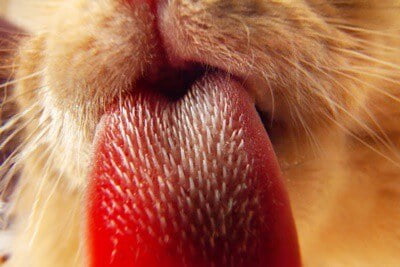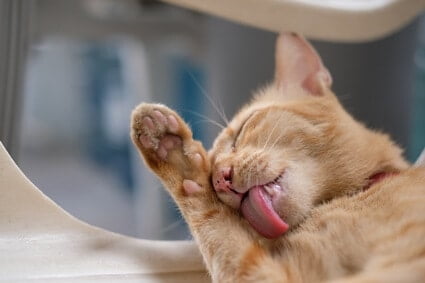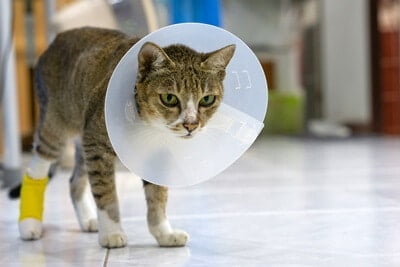When your cat sustains a flesh injury, it’s natural for it to lick the wound to remove any dirt and debris. You might have heard that cat saliva heals injuries. That can make it appear like a healthy, normal behavior that’s beneficial to your cat’s healing process. However, cats can get bacterial infections when they lick their wounds excessively.
While cat saliva has antibacterial properties that aid healing and recovery, it also hosts harmful bacteria. If any bacteria enter the wound, they can cause abscesses or infections. The antiseptic qualities of saliva are best suited for open wounds, but they’re not a substitute for vet-prescribed antiseptics or antibiotics.
Licking wounds can become a soothing gesture for your injured cat. From here, it may become compulsive and even harmful to the injury or the skin around it. Fortunately, there are ways to train your cat to stop licking its wounds. You use a clicker and treats to entice your cat into leaving the injury alone. If it doesn’t respond, you can tightly wrap the injury or put your cat in a specialized onesie to limit its access.
What Does Cat Saliva Contain?
Your cat’s saliva has antibacterial properties that can:
- Soothe its pain
- Stimulate healing
- Kill bacteria in the wound
Essentially, cats’ saliva has antiseptic properties. That means that it can break down harmful bacteria, as well as prevent some of the worst bacteria from growing within your cat’s mouth.
| Enzyme or Antibiotic | Biological Function |
|---|---|
| Lysozyme | An enzyme that attacks the cell walls of harmful bacteria |
| Defensins | An antibiotic created by the body’s white blood cells |
| Peroxidase | A group of enzymes that acts as a defense against harmful pathogens |
| Lactoferrin | A protein that contains antioxidants and anti-inflammatory properties |
| Sialotonin | The Journal of Physiology states sialotonin has vasodepressive effects on the body, meaning it can help to reduce blood pressure |
Of course, this doesn’t mean that your cat’s mouth will be entirely clear of disease or other oral issues, either. There are times when a cat’s saliva does more harm than good.
Do Cats Carry Bacteria in Their Mouths?
According to Veterinary World, cats have zoonotic bacteria in their mouths. These are harmful bacteria that can be transferred from animals to humans via biting. Some of these bacteria are even resistant to antibacterial treatments.
In a study of around 200 dogs and cats, it was found that 92.5% of all these animals carried zoonotic bacteria in their mouths. Indeed, it is estimated that around 20-80% of all reported cat bites at hospitals will become infected. This is due to the cat’s oral flora (or congregation of bacteria in its mouth).
This can then seem counterintuitive to the other properties found within your cat’s saliva. They will not necessarily cancel each other out. As such, it is still important to remember that your cat’s mouth is not the cleanest place, either.
Why do cats have so much bacteria in their mouths? This is largely due to the food they eat and any dental issues they may have. Leftover food particles, plaque, and other bacteria in the mouth can develop into different oral issues. Even if they don’t, they will dwell in your cat’s saliva.
Should You Let a Cat Lick a Wound?
Is it bad for a cat to lick its wounds? You don’t want your cat to agitate or infect its wounds. However, you don’t want to deprive it of comfort or the healing enzymes found in its saliva, either.
So, can a cat heal a wound by licking it? The answer is a bit more complicated than it may seem. Mainly, it depends on the type of wound your cat has sustained.
Should a Cat Lick an Open Wound?
Any open wounds that your cat sustains should be treated to prevent infections.
Of course, your cat may do its own first-aid through licking the wound. The antibacterial properties can temporarily relieve the initial pain and brush away any dirt or blood in the wound itself.
Cat tongues are covered in small barbs to remove debris that might have fallen into the wound. In this way, the Philosophical Transactions of the Royal Society B state that saliva can act as an all-purpose ointment when all else fails.
Of course, it is still a good idea to treat the wound yourself or take your cat to a vet for treatment. Even if your cat licks its open wound, thoroughly clean it out before binding it.
Should I Let My Cat Lick Its Abscess?
An abscess is defined as a pocket within the skin that contains pus. It’s not a good idea to let your cat lick at an abscess as it can open it up and become infected.
Stop your cat from licking scabs, too. It is possible for excessive licking to reopen the wound and even lead to a lick granuloma. This is a far worse condition than a mere scabbed wound.
Lick Granuloma
Constant licking of the wound might be your cat’s way of making itself feel better. However, it shouldn’t be encouraged. Constant licking is a way of aggravating the wound and the skin around the wound itself. This can then create a lick granuloma. It’s a dermatological condition caused by excessive licking of a wound.
Typically, lick granuloma appears like the wound has become inflamed. It may leave an unsightly plaque or raised border along its wound. This can then irritate or infect the wound further. Lick granulomas may be classified as wounds themselves, especially if your cat continues to lick at the irritated areas with no sign of stopping.
Your cat may first lick its wounds to self-soothe, and eventually, it may become dependent on the motion to comfort itself or distract itself from the healing wound. This excess licking should be discouraged. Training your cat not to follow its instincts can be tricky, but it’s not impossible to help it overcome this compulsive urge.

How to Keep a Cat from Licking Wounds
If your cat won’t stop licking wounds, then this can become a problem. You don’t want your cat to develop an infection or a lick granuloma, even if licking can soothe it for a short period of time. Dressing your cat’s wounds and making sure it is comfortable should be your top priority if you want it to heal quickly.
How to Heal an Open Wound on a Cat
Healing an open wound on your cat isn’t difficult, but it will depend on its severity.
If your cat has a deep wound that requires stitches, take it to your veterinarian. Otherwise, here is how you can bind an open wound on your cat below:
- Apply pressure to the wound with dry gauze. Blood clots take around 5 to 10 minutes to form before blood flow slows.
- Wash out the wound with an iodine or saline solution if directed by a veterinarian.
- Never use ointments, creams, or other disinfectants without your veterinarian’s explicit approval.
- You may wrap it in a bandage or leave it open to prevent bacterial growth in the closed wound.
- Clean out and dress the wound daily with fresh bandages.

How to Keep Cat from Licking Stitches Without Cone
If your cat’s injury requires stitches, it may still try to lick at the sealed wound. Excess licking can cause the stitches to come undone or even burst apart, opening the wound all over again.
An effective way to prevent your cat from fussing with its stitches is to put a cone around its head. Of course, your cat will not have any fun wearing that cone. The cone may impede it from living comfortably in your home.
The good news is that you can skip the cone by training your cat to stop licking the wound. It takes some work, but it will be worth it to see your cat remain healthy. Clicker training works with almost anything you want to teach your pet:
- Introduce your cat to the clicker gradually by offering it a treat and clicking when it accepts the treat.
- Do this multiple times for as long as your cat is willing to sit and accept treats.
- Your cat will soon understand that clicking means treats.
- Discourage your cat from licking its wounds, then feed it treats and use the clicker when it avoids the wound.
- This will teach it to stop any excessive licking. You can stop your cat from licking ointment treatments as well.
Another, simpler method is to tightly bind the wound so that your cat cannot lick it or bite it at all. Some owners will also dress their cat in a special onesie to prevent it from licking at its wound through the cloth.
Does Cat Saliva Heal Wounds?
Cats licking their wounds isn’t necessarily a bad habit. However, it’s unwise to encourage this behavior. Though cat saliva does contain some useful properties, the number of bacteria that can fester within its mouth cannot be understated. Indeed, your cat may even make the wound worse with excessive licking.
Cat saliva also doesn’t heal the wound itself. The antibacterial properties are used to stave off certain infections. However, they cannot be substituted for medical treatments. You need to treat your cat’s wounds or have your veterinarian treat them before the wound becomes infected.

